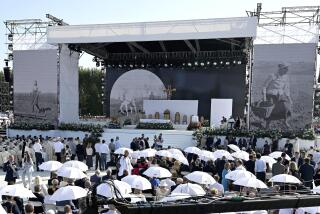Lithuania Denies Charges on Clearing War Criminals : Nazis: But the Wiesenthal Center reiterates that it has proof of at least two rehabilitations. And it expects evidence of more.
- Share via
VILNIUS, Lithuania — Battered by a storm of international criticism as it re-emerges as an independent country, Lithuania’s government Wednesday strongly denied charges that it is deliberately clearing many of its citizens of complicity in Nazi war crimes against Jews.
A leading American Jewish organization, however, reaffirmed earlier assertions that it held proof of at least two such rehabilitations and expects to receive evidence soon that more than 100 Nazi war criminals have been cleared of wrongdoing.
In public statements issued here and at a press conference held by senior officials in Moscow, the government of Prime Minister Vytautas Landsbergis flatly denied accusations that at least two Lithuania soldiers who confessed to anti-Jewish massacres before Soviet tribunals have been cleared of the charges this year without further investigation.
A third, the government acknowledged, had been cleared or “rehabilitated” after the Supreme Court of Lithuania reviewed the case against him and determined that it was “not proven,” although his conviction by a Soviet tribunal had been based on testimony from six witnesses.
Members of the government have suggested that the evidence of rehabilitations of mass murderers may have been trumped up by the Soviet KGB as part of a last-ditch attempt to smear the new government. And they have argued that the testimony against the men, which in some cases includes confessions, may have been falsified or elicited under duress.
The government also said more than 400 applications for rehabilitation have been rejected--about 1% of the total--because of evidence that the person engaged in anti-Semitic massacres, torture or collaboration with the Nazis.
But the head of the Simon Wiesenthal Center, the Los Angeles-based organization that first aired the charges, reiterated Wednesday that he has firm proof that the certificates of rehabilitation were issued in the first two cases. The proof includes literal translation in typescript of the original Russian and Lithuanian documents.
In the third case, said Rabbi Marvin Hier, dean of the center, the soldier’s conviction by a Soviet military court had been based on testimony from six witnesses.
“When they say there was lack of evidence, is it because the witnesses are dead?” he asked.
Responding to Lithuanian assertions that a few known war criminals may have been mistakenly rehabilitated in processing scores of thousands of applications, Rabbi Hier remarked that the apparent number of cases was too large. A group of Jewish activists in Vilnius furnishing information to the center has indicated that as many as 110 cases may exist, he said.
The question of rehabilitating convicted war criminals could sour relations between the infant Lithuania and some of its most important potential supporters, including the United States and Israel. A former Communist state whose economy is in shambles, Lithuania desperately needs Western financial support.
Since the Wiesenthal charges were published by the New York Times on Sept. 5, government offices here have been flooded with critical letters from American Congress members and others. Survivors in Israel of the Nazi Holocaust are also pressuring the government there to withhold formal recognition of Lithuania.
In Moscow on Wednesday, Lithuanian state prosecutor Vidmantas Vakekauskas, who is overseeing part of the rehabilitation program, told a press conference: “The theory of Nazi sympathizers’ rehabilitation is completely false.”
Added Lithuanian Vice President Kazimieras Motieka: “We’re not saying that Lithuanians were not involved in the killing of Jews. There were such cases. Every state has its negative elements and we are no exception.” Motieka pledged to work with Jewish organizations and Israeli authorities to uncover Holocaust-related cases.
“If we are aware of any of the rehabilitations by mistake,” the government will rectify the errors “as soon as we have case names,” he said.
At issue is a procedure established here under a May 2, 1990, law designed to overturn thousands of sentences imposed on Lithuanians by Soviet courts after the Soviet Union’s military conquest of the country in 1944. Many of the original sentences were pretexts to allow the new regime to seize Lithuanians’ property, silence political enemies, quash armed resistance and deport laborers to Siberia and elsewhere.
But the Soviets, in their battle against German forces in the Baltic states and western Russia, also unearthed evidence of extensive massacres of Jews by Nazi commandos and by attached Lithuanian units. When they liberated the Baltic region from German control in 1944 they placed many participants on trial, sentencing them to 50 years in prison or more.
The May, 1990, law specifically exempted such war criminals from rehabilitation. The country’s chief prosecutor, Artusas Paulauskas, reiterated the exemption last June during a meeting in Lithuania with a team from the Wiesenthal Center.
“Mr. Paulauskas stated categorically that those individuals who had participated in the murder of civilians during World War II would not be granted rehabilitations,” Rabbi Hier wrote in August to Landsbergis. He warned that the rehabilitations might “stain the historical achievement realized with the re-emergence of a free Lithuania.”
Since the law’s enactment, Motieka said nearly 47,000 Lithuanians have been granted certificates expunging their Soviet-generated criminal records. He said that 417 applications have been rejected, while another 6,000 cases remain under review.
The rehabilitation allows the recipients or their heirs to try to reclaim seized property, back pay and pension privileges.
All three newly independent Baltic states are grappling with ways to redress what they view as legal and physical injustices perpetrated by the Soviets during 51 years of occupation.
The effect on Holocaust cases is particularly important because of Lithuania’s reputation of enthusiastic participation in anti-Semitic brutality.
As early as the 1920s, Jews here were barred from certain businesses. A strong current of anti-Semitism inspired more than 20,000 Jews to emigrate from the country between the two world wars. Before World War II, many Lithuanians sided with Nazi Germany against the Soviet Union, which they viewed as a more distasteful foe.
Decimated by Hitler’s “final solution” and the Soviet deportations, only 10% of Lithuania’s prewar Jewish community of 300,000 survived.
One notorious Lithuanian unit was the 12th Police Battalion, which was attached to a Nazi military formation.
At least one person said to have been rehabilitated by the Lithuanian government was a member of the unit. He was Aloizas Juodis, who joined the battalion in 1941 and deserted it in 1942. Early that year, he evidently confessed in 1948, he participated in the murders of 700 to 1,000 Jews near Minsk in a single day by helping to drive them into open graves and shooting them.
“I personally approached . . . several times and executed by shooting,” he said. “It is hard to say how many persons I executed by shooting.”
Despite this confession and testimony by four other members of the battalion, according to the Wiesenthal Center’s documents, Juodis was granted a certificate of rehabilitation on June 5 of this year.
More to Read
Sign up for Essential California
The most important California stories and recommendations in your inbox every morning.
You may occasionally receive promotional content from the Los Angeles Times.













